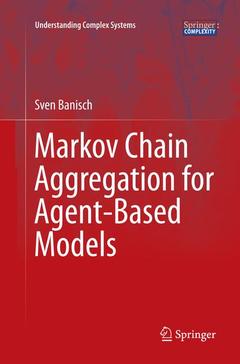Description
Markov Chain Aggregation for Agent-Based Models, Softcover reprint of the original 1st ed. 2016
Understanding Complex Systems Series
Author: Banisch Sven
Language: English
Subject for Markov Chain Aggregation for Agent-Based Models:
Approximative price 79.11 €
In Print (Delivery period: 15 days).
Add to cart
Markov Chain Aggregation for Agent-Based Models
Publication date: 03-2018
Support: Print on demand
Publication date: 03-2018
Support: Print on demand
Approximative price 79.11 €
In Print (Delivery period: 15 days).
Add to cart
Markov Chain Aggregation for Agent-Based Models
Publication date: 01-2016
Support: Print on demand
Publication date: 01-2016
Support: Print on demand
Description
/li>Contents
/li>Comment
/li>
This self-contained text develops a Markov chain approach that makes the rigorous analysis of a class of microscopic models that specify the dynamics of complex systems at the individual level possible. It presents a general framework of aggregation in agent-based and related computational models, one which makes use of lumpability and information theory in order to link the micro and macro levels of observation. The starting point is a microscopic Markov chain description of the dynamical process in complete correspondence with the dynamical behavior of the agent-based model (ABM), which is obtained by considering the set of all possible agent configurations as the state space of a huge Markov chain. An explicit formal representation of a resulting ?micro-chain? including microscopic transition rates is derived for a class of models by using the random mapping representation of a Markov process. The type of probability distribution used to implement the stochastic part of the model, which defines the updating rule and governs the dynamics at a Markovian level, plays a crucial part in the analysis of ?voter-like? models used in population genetics, evolutionary game theory and social dynamics. The book demonstrates that the problem of aggregation in ABMs - and the lumpability conditions in particular - can be embedded into a more general framework that employs information theory in order to identify different levels and relevant scales in complex dynamical systems
Introduction.- Background and Concepts.- Agent-based Models as Markov Chains.- The Voter Model with Homogeneous Mixing.- From Network Symmetries to Markov Projections.- Application to the Contrarian Voter Model.- Information-Theoretic Measures for the Non-Markovian Case.- Overlapping Versus Non-Overlapping Generations.- Aggretion and Emergence: A Synthesis.- Conclusion.
Introduces and describes a new approach for modelling certain types of complex dynamical systems
Self-contained presentation and introductory level
Useful as advanced text and as self-study guide
Includes supplementary material: sn.pub/extras
© 2024 LAVOISIER S.A.S.

